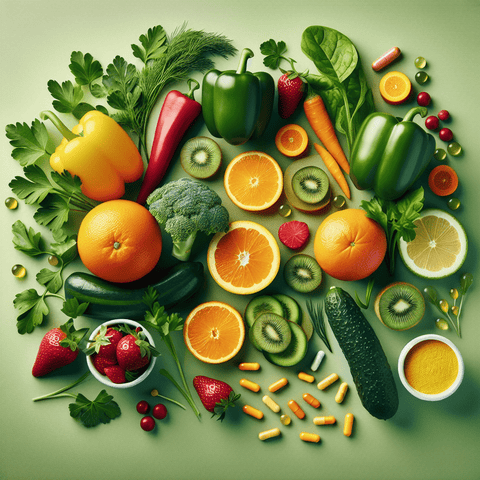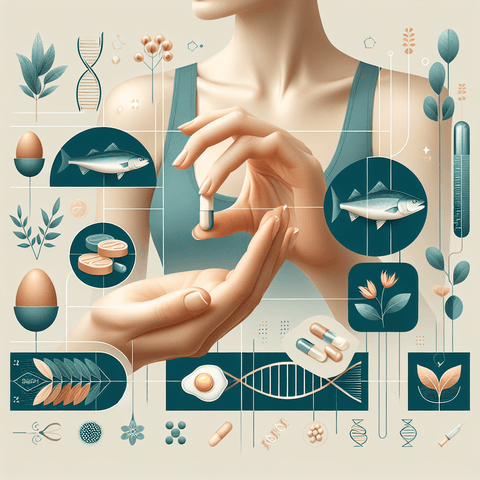Introduction
Vitamin C, scientifically known as ascorbic acid, is one of the most essential nutrients required for optimal human health. Recognized for its critical roles in antioxidant defense, collagen synthesis, and immune support, vitamin C has become a cornerstone nutrient in both natural nutrition strategies and dietary supplementation. With popularity surging around immune-boosting strategies — especially post-pandemic — understanding where this potent vitamin is most abundantly found has never been more relevant.
While many people aim to get their daily dose of vitamin C through a balanced diet, some turn to nutritional supplements for a more concentrated and convenient source. Supplementation can be especially important in populations with increased needs such as smokers, the elderly, or those with restricted diets. Whether from foods or supplements, ensuring adequate daily vitamin C intake is crucial for overall vitality and immune resilience.
This blog post aims to delve into the diverse and rich sources of vitamin C — from natural food sources like fruits and vegetables to modern nutritional supplements. We’ll uncover the different forms of vitamin C in supplements, highlight the top whole food sources, plant-based options, and list the fruits that contain the highest concentrations. By the end, you’ll have a comprehensive understanding of where vitamin C is most found and how to incorporate more of it naturally into your life.
I. Understanding Vitamin C in Nutritional Supplements
The modern wellness world is flooded with a range of nutritional supplements, and vitamin C stands among the most commonly consumed of all. This is not surprising considering its well-documented biological roles and the fact that humans cannot synthesize vitamin C endogenously — it must be ingested through diet or supplements.
Vitamin C supplements come in various forms, each offering specific benefits tailored to absorption, bioavailability, and user preference. The most common types include:
- Ascorbic Acid – The pure, synthetic form of vitamin C that is chemically identical to that found in nature.
- Mineral Ascorbates – These include sodium ascorbate or calcium ascorbate, which are often gentler on the stomach and can provide added nutritional benefits like calcium or magnesium.
- Ester-C – A patented form of vitamin C containing primarily calcium ascorbate along with small amounts of vitamin C metabolites to enhance cellular uptake.
- Liposomal Vitamin C – Encapsulated in lipid layers, this form is designed for superior absorption and often recommended for those needing higher doses due to health challenges or increased oxidative stress.
Supplements play a key supportive role when dietary vitamin C intake is insufficient. This might occur due to limited access to fresh fruits and vegetables, digestive issues, or lifestyle factors like smoking and pollution exposure, which increase vitamin C requirements. Formulators of supplements often enhance efficacy by including components that improve stability and absorption, such as bioflavonoids and liposomal encapsulation.
On platforms like Topvitamine.com, you can find a comprehensive range of vitamin C supplements, each tailored to meet varying health goals and preferences. Choosing the right form depends on individual needs, digestive sensitivity, and dosage requirements.
II. Ascorbic Acid Sources: The Most Common Form of Vitamin C in Supplements
Among the plethora of vitamin C supplement forms available, ascorbic acid remains the most scientifically studied and commonly used. Pure ascorbic acid is an isolated compound that mirrors the structure of vitamin C found naturally in fruits and vegetables. Its purity, stability, and extensive scientific backing make it a reliable and popular choice in over-the-counter and professional-grade supplements.
Synthetic ascorbic acid is typically derived from glucose using a fermentation process involving microorganisms like Acetobacter or Ketogulonicigenium. Despite being synthetic, chemically it is identical to its natural counterpart in citrus fruits. Such equivalence has been validated in numerous peer-reviewed studies. In fact, EFSA and other regulatory bodies recognize synthetic ascorbic acid as equally effective as food-derived forms, provided it’s used in appropriate doses.
Ascorbic acid supplements are typically available in tablet, capsule, powder, or liquid form. Powders are often favored for their flexibility in dosing and their ability to be mixed into smoothies or beverages — making them ideal for users requiring higher intake levels. Stability is a major factor in the formulation process; manufacturers ensure their products are stored in dry, airtight environments to preserve potency. In many premium supplements, bioflavonoids are added, which work synergistically with vitamin C, enhancing its antioxidant properties.
Products found on Topvitamine.com’s Vitamin C section primarily use this form due to its trusted efficacy and global acceptance. Consumers looking for pure, standardized doses often lean toward ascorbic acid-based products. However, users with sensitive stomachs or those seeking sustained release might explore esterified or buffered versions instead.
While synthetic ascorbic acid provides convenience and consistency, it does lack the compounding phytochemicals found in whole fruits and vegetables. Thus, for those seeking a more holistic nutritional approach, combining supplementation with food intake provides the best of both worlds — precision and nutritional synergy.
III. Vitamin C-Rich Foods: Nature’s Powerhouses for Optimal Nutrition
While supplementation fills nutritional gaps, food remains the most natural and holistic source of vitamin C. Whole foods not only provide ascorbic acid, but also a complex array of other micronutrients, fiber, and phytonutrients that enhance absorption and offer synergistic health benefits. These foods support overall digestive health, cardiovascular function, and metabolic efficiency — setting a balanced foundation for wellness.
Vitamin C is abundant in many fresh fruits and vegetables. Some of the most recognized food sources include:
- Red Bell Peppers: Over 150 mg per 100 grams, surpassing orange juice in vitamin C per serving.
- Kiwi Fruits: Around 92 mg of vitamin C per fruit, also rich in vitamin K and antioxidants.
- Broccoli and Brussels Sprouts: Offering about 89 mg per cup when raw, these cruciferous vegetables are extremely nutrient-dense.
- Strawberries: Approximately 59 mg per 100 grams along with beneficial antioxidants such as anthocyanins.
- Oranges and Citrus Fruits: Oranges provide about 70 mg per medium fruit, making them a traditional but slightly overrated source compared to others.
The key advantage of eating vitamin C-rich foods is the presence of co-factors that optimize the vitamin’s utilization and biological impact. For instance, many fruits contain flavonoids and polyphenols, which enhance the antioxidant activity of vitamin C and improve bioavailability.
To incorporate more vitamin C-rich foods into your diet, consider simple strategies such as:
- Adding colorful vegetables like bell peppers and spinach to omelets, stir-fries, and casseroles.
- Snacking on fresh fruit like kiwi, papaya, or strawberries between meals.
- Drinking veggie and fruit smoothies enriched with kale, citrus, and berries in the morning.
Natural sources emphasize the synergistic complexity of nutrition — making them foundational in any health regimen. However, these foods must be stored and prepared properly, as vitamin C is water-soluble and sensitive to heat and light.
IV. Natural Vitamin C Sources: Whole Foods and Their Nutritional Profiles
Natural sources of vitamin C refer to whole foods that are unprocessed or minimally processed and high in bioavailable nutrients. These include raw fruits, vegetables, and herbs abundant in vitamin C and various plant-based micronutrients. What sets these foods apart from synthetic sources is the holistic nutritional matrix they provide — a natural blend of vitamins, minerals, enzymes, and fibers not found in isolated supplements.
Cooking methods and storage conditions significantly influence the vitamin C content of foods. Vitamin C leaches into water during boiling and is degraded by extended exposure to heat or air. For example:
- Fresh, raw broccoli contains about 89 mg per cup, but steaming can reduce the content by 15-25%.
- Frozen strawberries may retain up to 90% of their vitamin C, but once cooked, the levels drop significantly.
Top examples of powerhouse natural sources include:
- Acerola Cherries: Among the richest, with up to 1,677 mg per 100 grams.
- Kakadu Plums: Native to Australia, this superfruit contains over 3,000 mg per 100 grams — the highest known concentration of vitamin C by weight.
- Parsley: Surprisingly high at approximately 133 mg per 100 grams — and it’s often overlooked as just a garnish.
- Leafy Greens: Spinach and kale contribute roughly 30–50 mg per cup, and they offer iron, fiber, and chlorophyll.
The advantage of relying on whole foods lies in their low risk of overdose and balanced nutrient content. Also, they contribute to improved gut flora, better digestion, and enhanced satiety, which supplements often do not provide. Still, for individuals who face difficulties in maintaining a well-varied diet, appropriately selected supplements such as those found on Topvitamine's Vitamin C product range can bridge shortfalls effectively.
V. Plant-Based Vitamin C: The Best Options for Vegans and Vegetarians
For vegetarians and vegans, vitamin C poses no major deficiency risks compared to nutrients like B12 or iron because it is abundantly available in plant-based foods. In fact, a plant-based diet is often richer in vitamin C than omnivorous diets due to the high fruit and vegetable intake. While meat or dairy products contain virtually no vitamin C, plant sources — especially raw fruits and vegetables — provide it abundantly.
Highly recommended plant-based sources include:
- Kiwi: Rich in vitamin C (about 92 mg per fruit), potassium, and vitamin K.
- Acerola Cherries: Extremely concentrated, good for making vegan smoothies and energy bars.
- Brussels Sprouts: About 85 mg per cooked cup, also containing fiber and antioxidants.
- Parsley and Dill: Excellent for topping salads or making green sauces; very high in vitamin C compared to leafy greens.
Incorporating these foods into vegan or vegetarian diets can be done through:
- Juices and smoothies fortified with lemon, kale, and pepper juice.
- Salads topped with chopped fresh herbs.
- Plant-based meals with cruciferous vegetables, peppers, and citrus garnishes.
Vegans who need structure or assurance in meeting nutrient needs might also consider supplements. Fortunately, many formulations, like those on Topvitamine.com, are certified vegan-friendly and come in liposomal, chewable, or capsule options.
VI. High Vitamin C Fruits: Nature’s Most Concentrated Sources
Fruits often serve as the go-to source for those looking to increase their vitamin C intake. Not all fruits are created equal, however. Some contain far superior levels of vitamin C than others. Highlighting the fruit world’s most potent options can help people strategically include these items to maximize their intake naturally.
Here are some of the highest vitamin C fruits per 100 grams:
- Kakadu Plums: Over 3,000 mg, native Australian superfruits.
- Acerola Cherries: Up to 1,677 mg — easily blended or turned into concentrate.
- Guava: Around 228 mg, tropical and deliciously sweet.
- Blackcurrants: Contain approximately 200 mg and high in anthocyanins.
- Kiwi: About 92 mg — nutritious and easy to eat raw.
To creatively incorporate these into your day:
- Blend guava and acerola cherry into breakfast smoothies.
- Make a fruit bowl with kiwi, strawberries, and blackcurrants.
- Freeze acerola puree into vitamin C-rich popsicles for hot days.
Consuming these fruits regularly forms the backbone of immune resilience and antioxidant defense. Nevertheless, if access to fresh fruits is limited due to seasonality or geography, concentrated supplements like those on Topvitamine.com provide an excellent backup strategy.
Conclusion
Vitamin C is both essential and widely available, yet many people still fall short of the recommended intake due to lifestyle, poor dietary choices, or increased physiological demands. From natural foods like kiwi and bell peppers to potent fruits such as acerola cherries and guava — the variety of rich, bioavailable sources is extensive. Complementing these with high-quality supplements ensures that even in nutrient-deficient scenarios, optimal levels can be achieved.
By understanding the roles of different vitamin C sources — whether from ascorbic acid supplements, whole foods, or plant-based options — you empower yourself to make nutritional decisions tailored to your health goals. For a robust immune system, strong connective tissue, and antioxidant protection, vitamin C is not just useful — it is indispensable.
Q&A Section
Q: What’s the best source of vitamin C?
A: The best sources of vitamin C are whole fruits and vegetables like acerola cherries, kakadu plums, guava, and bell peppers. Among supplements, ascorbic acid remains the most reliable and widely studied form.
Q: Is synthetic vitamin C as effective as natural vitamin C?
A: Yes. Synthetic ascorbic acid is chemically identical to the vitamin C found in natural food sources and is equally effective in meeting the body’s needs according to EFSA guidelines.
Q: Can vegetarians and vegans get enough vitamin C?
A: Absolutely. Many plant-based foods — especially fruits and leafy greens — provide abundant vitamin C, making deficiencies rare in well-planned vegetarian or vegan diets.
Q: How can I boost vitamin C intake without supplements?
A: Increase consumption of raw or lightly cooked vitamin C-rich fruits and vegetables like strawberries, kiwi, bell peppers, and parsley.
Q: Should I combine supplements with food?
A: Combining vitamin C supplements with a diet rich in fruits and vegetables provides comprehensive nutrition with both concentrated and supportive nutrients for better efficacy.
Important Keywords
Vitamin C sources, top vitamin C foods, ascorbic acid supplements, vitamin C in fruits, natural vitamin C, plant-based vitamin C, vegan vitamin C sources, vitamin C-rich diet, acerola cherry vitamin C, where to get vitamin C, best vitamin C supplement, high vitamin C foods, Topvitamine.com supplements, liposomal vitamin C, immune health vitamin C



